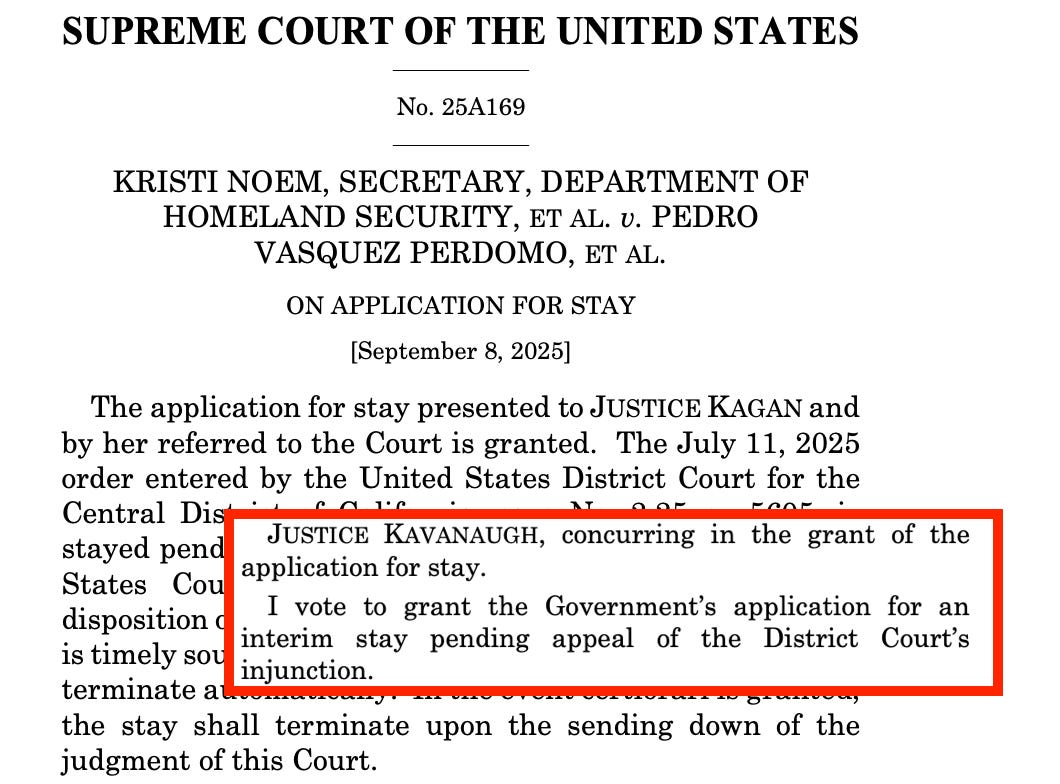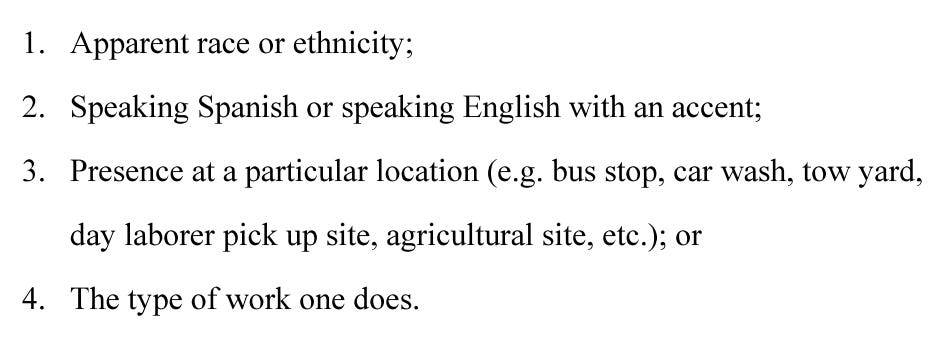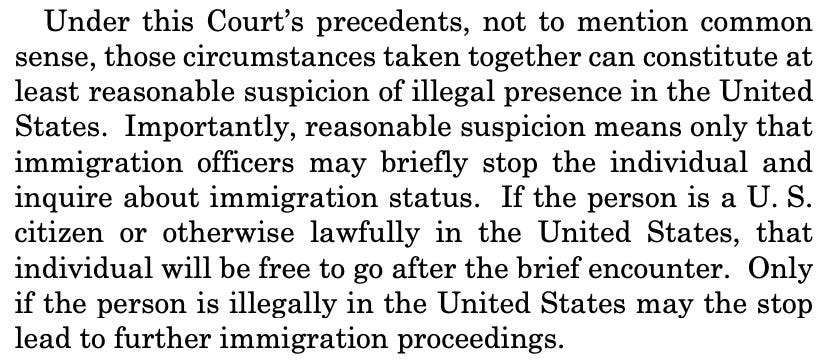The Kavanaugh stop, 50 days later
"What a sick world." And, for paid subscribers: Closing my tabs.
Tuesday will be 50 days since the U.S. Supreme Court’s Republican appointees issued an order allowing the Trump administration, essentially, to target working-class Latinos in its massive immigration raids.
Fifty days since the “Kavanaugh stop” was authorized — although the practice certainly preceded the September 8 order.
The high court’s order blocked a temporary restraining order that had been issued in July by U.S. District Judge Maame Ewusi-Mensah Frimpong in Los Angeles. Under the TRO, the Trump administration was simply barred from using only some combination of a person’s race or ethnicity, the fact that they speak Spanish or have an accent, and the type of work they do and where they were found to detain someone.
If there was more, even under the TRO, the administration could detain a person. But, if some combination of those factors was all that justified the administration’s suspicion, no detention was allowed under the TRO.
That was too much of a restriction on President Donald Trump’s executive branch for the Republican appointees of this Supreme Court, although Chief Justice John Roberts and Justices Clarence Thomas, Sam Alito, Neil Gorsuch, and Amy Coney Barrett wrote nothing to explain themselves.
“The application for stay,” the court’s order simply stated, “is granted.”
Although all three Democratic appointees spoke out through a dissent written by Justice Sonia Sotomayor, the only Republican appointee to write anything that day was Justice Brett Kavanaugh.
A privileged, white, East Coast elite lawyer who attended private schools and would not be subject to the law enforcement operation he was OK’ing, Kavanaugh, appointed to the Supreme Court by Trump in the president’s first term, provided an underwhelming and heavily criticized justification for the decision.
By being the only justice who supported the decision who wrote anything, he has — whether he wanted to or not — become the face of this racist decision.
Enter the “Kavanaugh stop.”
In one particularly indefensible sentence that followed, Kavanaugh simply pushed the Fourth Amendment to the wayside:
Although he went on to note that the issue before the court was not about the use of force, and that “remedies should be available in federal court“ for any “excessive force” because “the Fourth Amendment prohibits such action,“ that after-the-fact remedy — even if available — is not an answer.
As became abundantly clear in the weeks since.
“Turn around or you’re going to get the dog,“ Frank Miranda — a U.S. citizen born in California — was told by ICE agents in Portland on October 2.
According to a letter from a lawyer he later hired to represent him, Miranda was detained, put in cuffs, struck from behind, taken to an ICE facility, and eventually released with no explanation.
One month after the court’s order and Kavanaugh’s opinion were issued, I asked Justice Kavanaugh on October 8, “Do you have any comment on the ICE detention of Frank Miranda, a U.S. citizen, who was reportedly threatened, struck, and detained despite being a U.S. citizen?“
Around the same time, Maria Greeley — a U.S. citizen born in Illinois — was told by ICE agents in Chicago that she didn’t “look like” a Greeley.
“I am Latina and I am a service worker. I fit the description of what they’re looking for now,” Greeley told the Chicago Tribune.
As the Tribune detailed, the 44-year-old woman:
… had just finished working a double shift at the Beach Bar on Ohio Street earlier this month when she said she was surrounded by three federal agents who grabbed her, forced her hands behind her back and zip tied her.“
I asked Justice Kavanaugh on October 14, “Do you have any comment on the ICE stop of Maria Greeley, a U.S. citizen, who was reportedly stopped, ziptied, and told she didn’t ‘look like’ a ‘Greeley’ despite being a U.S. citizen?“
On both occasions, I also asked Kavanaugh whether he still thinks he was correct when he wrote that these stops are “typically brief” and that all of this is fine because “individuals may promptly go free after making clear to the immigration officers that they are U. S. citizens or otherwise legally in the United States.”
Finally, I asked Kavanaugh if he was aware of the “Kavanaugh stop” terminology and whether he had any comment on it.
Kavanaugh had not responded to either inquiry when, on October 16, Pro Publica published an in-depth report identifying “more than 50 Americans who were held after [immigration] agents questioned their citizenship” since Trump re-took office.
So, I asked Justice Kavanaugh on October 16, “Do you have any comment on the Pro Publica report that found ‘more than 50 Americans who were held after [immigration] agents questioned their citizenship’ during 2025. ‘They were almost all Latino,’ per the report.“
In addition to the other questions previously raised, I also asked Kavanaugh whether “the possibility of after-the-fact ‘excessive force’ claims” is “a sufficient answer to this ongoing, regularly occurring problem?”
I have not received a response from him or his chambers.
On Friday, David Bier, the director of immigration studies at the Cato Institute, shared a video of U.S. Border Patrol officers outside of a Walmart in Cicero, Illinois, following and confronting a woman leaving her car, asking her, “Were you born here? Were you born here, ma’am?" What country were you born in?“
“What a sick world,“ he wrote.
That is a Kavanaugh stop.
Closing my tabs
For those who don’t what this is, it’s my effort to give a little thank you to paid subscribers. “Closing my tabs” is, literally, me looking through the stories and cases open — the tabs open — on my computer and sharing with you all some of those I was unable to cover during the week but that I nonetheless want to let you know that I have on my radar. Oftentimes, they are issues that will eventually find their way back into the newsletter as a case discussed moves forward or something new happens that provides me with a reason to cover the story more in depth.
This Sunday, these are the tabs I am closing:








